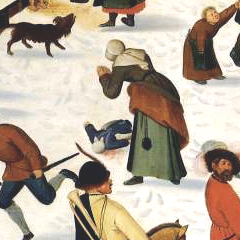
What are we to make of the massacre in Newtown, Connecticut?
Later in the month, both the Western and Eastern church will observe the slaughter of the Holy Innocents, that tragic moment in which King Herod answered the Gospel by trying to murder the Messiah.
As Matthew reports, “Then Herod, when he saw that he had been tricked by the wise men, was in a furious rage, and he sent and killed all the male children in Bethlehem and in all that region who were two years old or under. . .” (Matt 2.16).
He then quotes Jeremiah 31.15:
A voice was heard in Ramah,
wailing and loud lamentation,
Rachel weeping for her children;
she refused to be consoled,
because they were no more.
Many people — I think appropriately — have linked the tragic events of Newtown to this text. Ross Douthat’s column both somberly and beautifully reminds us of this side of the Christmas story. The senseless killing, the unspeakable loss, the inconsolable tears all point to the pain of Rachel — Rachael whose agony was so severe she would not be comforted.
We mourn with those who mourn, as we are told, but perhaps it is not always for us to comfort in such situations, particularly if all we can offer are platitudes and pious certainties. Victims need no friends of Job in these moments.
In his book The Doors of the Sea, David Bentley Hart writes that we should see in the death of child, not “the face of God but the face of his enemy.” We believe in Providence, yes, but we should be free to say that evil had its way. In a letter to a couple who had lost their child, Basil the Great is upfront with this fact: “[S]uddenly, through the malice of the devil, all that happiness of home and that gladness of heart has been swept away. . . .”
From the horrific scenes of Newtown glared the devil, his malice at fever-pitch and even the shooter his victim.
As Hart points out, we live in a world in which wheat and tare grow intertwined. But that inextricable connection does not force us to make peace with the tares or pretend they don’t exist. God didn’t plant the tares. Satan did. Rather, we are called to wait for the end when God will uproot and divide. “Now,” writes Hart, “we are able to rejoice . . . that, rather than showing us how the tears of a small girl suffering in the dark were necessary for the building of the Kingdom, [God] will instead raise her up and wipe away all tears form her eyes. . . .”
He references Revelation 21.3-5:
Behold, the dwelling of God is with men. He will dwell with them, and they shall be his people, and God himself will be with them; he will wipe away every tear from their eyes, and death shall be no more, neither shall there be mourning nor crying nor pain any more, for the former things have passed away. . . . Behold, I make all things new. . . these words are trustworthy and true.
That is our hope. Not to make sense of evil, but to hope in grace. When answers elude, only mercy remains.
Tomorrow in recognition of the Newtown tragedy, priests in many Orthodox parishes will add these words to the Litany of Fervent Supplication:
To Thee, O Lord, Who art in heaven, we raise up the eyes of our soul, and lift our hands, and sigh from the depths of our heart, and praying with our speech we cry out: give rest to the blest infants and to those who suffered with them in the present trouble and sorrow: hearken to those who weep and are pained, and await Thy consolation, asking Thy goodness; we ask Thy mercy and seek to obtain grace before Thee, and we knock upon Thy doors: open to us the doors of Thine abundant kindness, and abandon us not to the end, for Thy name’s sake. Let us say: Lord, hearken soon and have mercy upon all.
Lord, have mercy.
Lord, have mercy.
Lord, have mercy.












